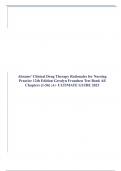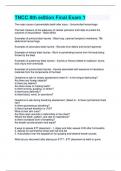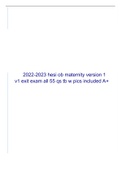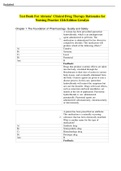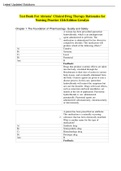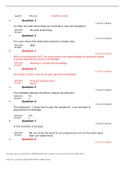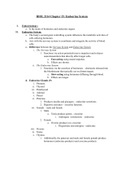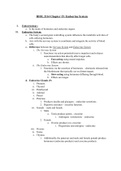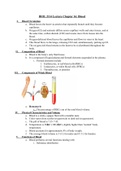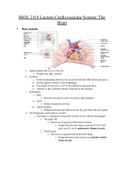West Georgia Technical College
Latest uploads at West Georgia Technical College. Looking for notes at West Georgia Technical College? We have lots of notes, study guides and study notes available for your school.
-
48
- 0
-
9
All courses for West Georgia Technical College
Latest notes & summaries West Georgia Technical College
1. A woman diagnosed with obsessive–compulsive disorder has been prescribed oral paroxetine hydrochloride. What is the expected effect for this prescription? A. Curative effect on symptoms B. Systemic effect on symptoms C. Local effect on symptoms D. Parenteral effect on symptoms ANS: B Rationale: Drugs that produce systemic effects are taken into the body, circulated through the bloodstream to their sites of action in various body tissues, and eventually eliminated from the body. Cur...
The major cause of preventable death after injury - Uncontrolled hemorrhage The best measure of the adequacy of cellular perfusion and helps to predict the outcome of resuscitation - Base deficit Examples of primary blast injuries - Blast lung, ruptured tympanic membrane, TBI, abdominal hemorrhage Examples of secondary blast injuries - Wounds from debris and bomb fragments Examples of tertiary blast injuries - Blunt or penetrating trauma from the body being thrown by the blast Examples o...
2022- 2023 hesi ob maternity version 1 v1 exit exam all 55 qs tb w pics included A+
Test Bank For Abrams’ Clinical Drug Therapy Rationales for Nursing Practice 12th Edition Geralyn-A woman has been prescribed paroxetine hydrochloride, which is an antidepressant agent administered in pill form. The medication is administered for her obsessive- compulsive disorder. This medication will produce which of the following effects? A) Curative B) Systemic C) Local D) Parenteral Ans: B Feedback: Drugs that produce systemic effects are taken into the body, circulated through the bloodst...
Test Bank For Abrams’ Clinical Drug Therapy Rationales for Nursing Practice 12th Edition Geralyn- 1. A woman has been prescribed paroxetine hydrochloride, which is an antidepressant agent administered in pill form. The medication is administered for her obsessive- compulsive disorder. This medication will produce which of the following effects? A) Curative B) Systemic C) Local D) Parenteral Ans: B Feedback: Drugs that produce systemic effects are taken into the body, circulated thro...
QUIZ 4 PHIL 201. Quiz #4 PHIL 201 INCORRECT IN RED • Question 1 For Plato, the realm where things are constantly in a flux and changing is: 3 out of 3 points • Question 2 For Locke, which of the ideas below would be a complex idea: 3 out of 3 points • Question 3 0 out of 3 points Which of the following is NOT one of the reasons that epistemologists are generally hesitant to accept testimony as a source of knowledge: • Question 4 According to Plato, how do we gain genuine knowledge? 0 out...
In chapter 15, learn how one of the two body's major control systems, The Endocrine, operates. From the chemical structure of a hormone to how a hormone acts through messengers by activating specific genes. This chapter also explains how thyroid glands work and how organs secrete hormones.
In chapter 15, learn how one of the two body's major control systems, The Endocrine, operates. From the chemical structure of a hormone to how a hormone acts through messengers by activating specific genes. This chapter also explains how thyroid glands work and how organs secrete hormones. In chapter 16, The functions of blood, such as transportation, regulation and protection, are discussed. The crucial role of erythrocytes in transporting oxygen and carbon dioxide is explained. Other compo...
In chapter 16, The functions of blood, such as transportation, regulation and protection, are discussed. The crucial role of erythrocytes in transporting oxygen and carbon dioxide is explained. Other components of blood in the body are also mentioned in this chapter, like leukocytes, platelets, hemostasis transfusion and more.
In chapter 17, this portion of the notes dives into the cardiovascular system: the heart. It talks about the four chambers and heart valves that flow blood. Other topics are the cardiac cycle and the different channels taken to get blood through the body, starting from the atrium ventricle.

